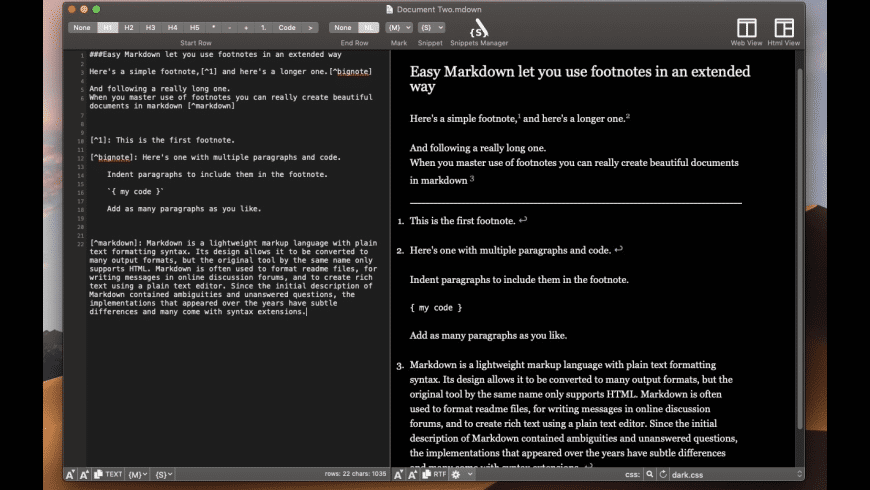Or, I could do research on something I'd like to write about and post to my shitty little website, keep all of the references on the wiki (in markdown format, so it's easy to transfer), and then, when I get it massaged into a format that I'm not overly ashamed of, post it for the world to see.
Markdown is probably the most commonly-used plain text markup used online, and is easy to get started with. The specific flavor of Markdown that Rippledoc uses is Pandoc-Markdown. Here’s a quick example of some pandoc-markdown -formatted text: first as the source you’d put into your file, then rendered as html.
And here’s that text rendered as html:
Paragraphs are separated by a blank line.
2nd paragraph. Italic, bold, and monospace. Itemized lists look like:
Markdown is a great tool/language for writing documentation and building styled content for books, etc. In a very source control friendly way. However, one area where it's lacking is in easy support for displaying tables. Fortunately, there's a free online tool that makes this easy, too! Markdown is often used to format readme files, for writing messages in online discussion forums, and to create rich text using a plain text editor. The main idea of Markdown is to use a simple plain text markup. It’s hard easy to make bold or italic text. Simple equations can be formatted with subscripts and superscripts: E 0 =mc 2. Dillinger is an online cloud based HTML5 filled Markdown Editor. Sync with Dropbox, Github, Google Drive or OneDrive. Convert HTML to Markdown. 100% Open Source!
- this one
- that one
- the other one
Note that — not considering the asterisk — the actual text content starts at 4-columns in.
Block quotes are written like so.
They can span multiple paragraphs, if you like.
Use 3 dashes for an em-dash. Use 2 dashes for ranges (ex., “it’s all in chapters 12–14”). Three dots … will be converted to an ellipsis. Unicode is supported. ☺
An h2 header
Here’s a numbered list:
- first item
- second item
- third item
Note again how the actual text starts at 4 columns in (4 characters from the left side). Here’s a code sample:
As you probably guessed, indented 4 spaces. By the way, instead of indenting the block, you can use delimited blocks, if you like:
(which makes copying & pasting easier). You can optionally mark the delimited block for Pandoc to syntax highlight it:
An h3 header
Now a nested list:
First, get these ingredients:
- carrots
- celery
- lentils
Boil some water.
Dump everything in the pot and follow this algorithm:
Do not bump wooden spoon or it will fall.
Notice again how text always lines up on 4-space indents (including that last line which continues item 3 above).
Here’s a link to a website, to a local doc, and to a section heading in the current doc. Here’s a footnote 1.
Tables can look like this:
| Name | Size | Material | Color |
|---|---|---|---|
| All Business | 9 | leather | brown |
| Roundabout | 10 | hemp canvas | natural |
| Cinderella | 11 | glass | transparent |

(The above is the caption for the table.) Pandoc also supports multi-line tables:
| Keyword | Text |
|---|---|
| red | Sunsets, apples, and other red or reddish things. |
| green | Leaves, grass, frogs and other things it’s not easy being. |
A horizontal rule follows.
Easy Markdown Table
Here’s a definition list:
- apples
- Good for making applesauce.
- oranges
- Citrus!
- tomatoes
- There’s no “e” in tomatoe.
Again, text is indented 4 spaces. (Put a blank line between each term and its definition to spread things out more.)
Here’s a “line block” (note how whitespace is honored):
Line too
Line tree
and images can be specified like so:
Inline math equation: (omega = dphi / dt). Display math should get its own line like so:
[I = int rho R^{2} dV]
Markdown Easy Meaning
And note that you can backslash-escape any punctuation characters which you wish to be displayed literally, ex.: `foo`, *bar*, etc.
Markdown Easy Definition
Pandoc also allows you to do a few more things besides. You can read more about that in the Pandoc Manual.
React-native-easy-markdown
Some footnote text.↩
